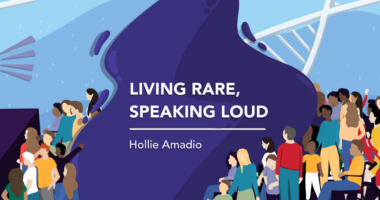What to Do When You Don’t Know What to Do

The familiar ding of the message notification pulled me out of my deep concentration. Between article deadlines, productions meetings, and numerous writing consultations, I was used to pausing to answer messages from clients, actors, and editors. So I lazily picked up my phone and opened the messaging app, only to be startled by a question I didn’t expect.
“What is it that thing your daughter has again?” the message read. I paused for a moment. The sender, a former colleague who had become a good “social media” friend, and I hadn’t talked in a long time. She had skipped the salutations or general questions about life and got straight to the point. But that’s not why the question surprised me.
After our oldest daughter, whom we lovingly call Ladybug, was diagnosed with hereditary angioedema (HAE), I couldn’t believe that a disease with such devastating results (if it goes untreated) was something I’d never heard of. Even during the early years of Ladybug’s odd symptoms, when I would go down the rabbit hole of medical diagnoses, HAE was never a search result.
Once I got past my initial denial about her HAE, I made it my business to tell the world about this rare chronic illness. I started hashtags on social media, invited friends and followers to join #teamladybug, and became unapologetic about informing people about hospital visits, medical challenges, and our wins and losses.
However, because I didn’t get that many “likes,” good wishes, or “thoughts and prayers,” I didn’t think anyone had noticed. Yet here I was staring at a message from a friend asking for more information.
She was reaching out on behalf of someone she knew who had these odd symptoms that my friend recognized based on some of my social media posts.
“She’s been to so many doctors,” my friend typed. “She doesn’t know what else to do.”
I immediately remembered those feelings I had when our family didn’t have any answers.
I remembered staring at my bedroom ceiling, frustrated after returning from a specialist visit with no answers. I recalled being in the emergency room with Ladybug and wanting to scream at a medical professional who accused Ladybug of having Munchausen’s syndrome, as if she were pretending to be ill. I remembered the times our daughter would sob on my lap because her face hurt to the touch, or she couldn’t open bottles because of her swollen hands. And when Ladybug would finally fall asleep out of sheer exhaustion, I remembered asking my husband, “What do we do?”
I felt for this woman I’d never met, but I was so glad that my friend reached out to me. So finally, driven by my memories, I typed out the best advice I could muster based on being on the other side of those feelings.
What do you do when you don’t know what to do?
Don’t stop advocating for yourself or the person you’re caring for. If you come across a medical professional who doesn’t believe you or doesn’t allow you to finish your sentences, find another one. When regular blood tests return “normal,” insist on more investigative tests. Ask about preventive and emergency medication that helps relieve your symptoms.
And while going through all that, find a fantastic support system that allows you to vent, laugh, cry, and learn with people who understand what you’re going through.
Whether you’re a caregiver or a person living with a rare disease and you need someone to listen, it can be discouraging when you hit obstacles and walls that prohibit you from finding the answers you need. If that happens, take on the mantra of the ancient general Hannibal: “We will either find a way, or make one.”
Note: Angioedema News is strictly a news and information website about the disease. It does not provide medical advice, diagnosis, or treatment. This content is not intended to be a substitute for professional medical advice, diagnosis, or treatment. Always seek the advice of your physician or other qualified health provider with any questions you may have regarding a medical condition. Never disregard professional medical advice or delay in seeking it because of something you have read on this website. The opinions expressed in this column are not those of Angioedema News or its parent company, Bionews, and are intended to spark discussion about issues pertaining to angioedema.







Leave a comment
Fill in the required fields to post. Your email address will not be published.